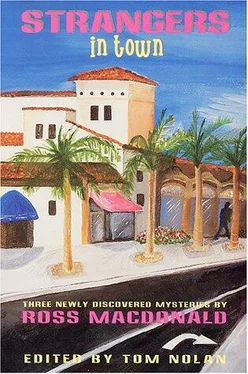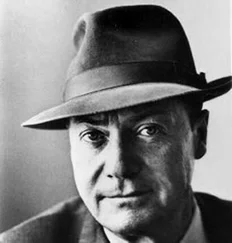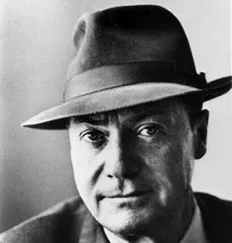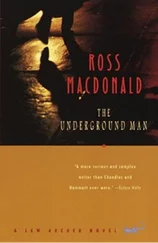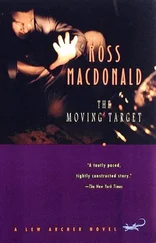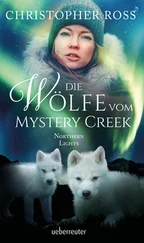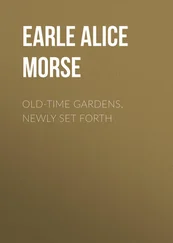In February 1945, Ensign Millar was assigned to duty aboard the U.S.S. Shipley Bay , an aircraft carrier in the south Pacific. But his exposure to cultural influence (Californian and otherwise) continued: through first-run Hollywood movies shown aboard ship, through live and recorded music, and through the books and magazines Millar read voraciously. In his isolated weeks at sea, Ken Millar was awash in all sorts of culture, from popular to mainstream to "mandarin." It all helped shape his own creative vision at this crucial juncture.
Millar admired the best art, high and low. The range of his appreciation can be seen in lines he wrote one of his Michigan professors from the Shipley Bay: "The Pacific bears some resemblance just now to Dante's non-spatial heaven, and I to a disembodied spirit speaking from the void. I like the place I'm haunting, though; the chow is good, the work is interesting and my fellow-spirits very helpful, I have a book by Andre Gide out of the ship's library, and the nightly movie tonight is 'My Favorite Blonde,' with Bob Hope…"
The Shipley Bay had a good lending library (Millar was thrilled to find his wife's Fire Will Freeze on hand); and Margaret mailed additional volumes to Ken. Among works Millar read in February and March of 1945 were Virginia Woolf's To the Light House ("a work of almost insane penetration into human relations," Ken commented to Margaret, in one of the near-daily letters they exchanged for almost a year, "and especially the nature of love and of vanity, which is love's little brother"), Mark Twain's Huckleberry Finn ("still a masterpiece"), Irving Stone's Lust for Life ("no masterpiece"), John Steinbeck's Tortilla Flat "often amusing but a leetle arty"), Oliver Onions' The Beckoning Fair One ("far and away the best horror story I have ever read"), Checkhov's The Hollow, Edmund Pearson's Studies in Murder, Lewis Carroll's Alice in Wonderland, Thurber and White's Is Sex Necessary? the sonnets of Shakespeare, and "The Song of Solomon."
Sitting out on deck in the tropics, Millar got sunburned reading John O'Hara's Butterfield 8. Drinking four beers and four whiskey sours in a ramshackle officers' club on some Pacific outpost, he "had a riproarious time" reading Agatha Christie's The Hazelmoor Mystery: "A singularly dull book, I thought; even alcohol couldn't stimulate more than a faint interest in it… Yeah, I figured out the Agatha in the first chapter, but then she wrote it way back in 1931. I remember seeing it when it came out in a magazine that year; I also remember how much better it seemed then…"
Among the nightly movies Millar saw aboard ship in the spring of 1945 were The Woman in the Window, Together Again with Charles Boyer and Irene Dunne ("a stinker"), The Guest in the House ("the first really good movie I've seen on board… really psychologico-shivery"), Belle of the Yukon with Gypsy Rose Lee ("so bad it was practically good") — and Double Indemnity, from the book by Millar favorite James M. Cain, with a script by Billy Wilder and Raymond Chandler ("really first class").
Bombarded by such stimuli, it wasn't long before Millar's own creative urge was aroused. On March 12 he wrote his wife he was "playing around with ideas for stories. I mean short stories, which interest me more right now than anything else." By March 17 he'd written "The Homecoming," a mainstream short about a serviceman returning to his wife. It was set in San Diego, since, as Millar told Margaret, these days "the only place I imagine with automatic ease is Southern California."
Without pause he began plotting two novels, one a wartime spy-story and the other a "psychological love-story" about a Navy survivor and a nurse. He took the spy-story for an OK to his commanding officer, who told him to run the plot past a Navy public relations man.
Partly Millar was moved to action by a letter from his Dodd, Mead editor, hoping Millar would be able to work up a book or two even while at sea. Also encouraging must have been an unexpected query forwarded from a Beverly Hills agent wanting to represent The Dark Tunnel for movie sale, and Millar for movie-writing. "No doubt it doesn't mean much," Ken shrugged to Margaret of the agent's letter, "but I liked getting it, and… if I wasn't otherwise occupied I'd certainly have a try at it."
Soon Millar reported that "the successor to Tunnel … is taking shape (in my head)." On March 24 he wrote Margaret excitedly, "I couldn't go to sleep last night for dreaming up my new thriller plot… I think it has the old nightmare quality — it should have, I got it in a nightmare practically…" By March 28 he'd written ten pages of The Long Ride, a novel whose story he admitted was "somewhat outlandish but it should do. The main thing is the action, which shifts from Oahu to Detroit to San Diego and Tia Juana… The long ride occurs on the Grand Canyon Limited, naturally, and also stands for death, also for the ride this guy was taken for, see? Maybe it has sexual implications, too."
Also sparking Millar's creativity this week was a finished copy of his wife's latest book, The Iron Gates, which he received aboard ship in late March; he immediately sat down and re-read "treasured bits" of it. Margaret had gotten a $500 advance for this manuscript, whose working title had been "The Skull Beneath the Skin." Her publisher Random House thought highly of the work; they packaged it handsomely and planned to promote it aggressively, not as a mystery but as "a novel of suspense." Their campaign would lead to important reviews, good sales, and favorable reprint deals. A movie deal seemed likely. Her husband urged Margaret to make her next book even better than Gates: "In the light of what you've done in less than five years, your possibilities seem practically limitless." Ken enumerated some qualities he thought Margaret Millar's writing and personality had in common: "Honesty so profound it makes you continually unhappy, and so much spirit you are literally younger now than when I met you… (I long since set myself the definite task of keeping up with you…)"
Besides his wife, the writer who most immediately inspired Ken Millar was Raymond Chandler, whose four detective books he'd read with intense pleasure. The second of these, Farewell, My Lovely (1940), had just been filmed as Murder, My Sweet, with Dick Powell starring as Chandler's private-eye hero Philip Marlowe. Ken Millar broke away from writing The Long Ride to watch Murder, My Sweet on the Shipley Bay screen the night of March 30. He loved what he saw. It wasn't as good as the Chandler-coscripted Double Indemnity, he thought, but he would enjoy it more than any other movie he'd see on ship.
"[I]f Chandler ever brings out another (book)—" Millar wrote Margaret, "which is doubtful since he can do the same stuff for Hollywood at 10 times the price — be sure to send it to me — he's the only one that carries me away — you don't count: you'd carry me away if you couldn't write your name."
After that Marlowe movie, the following weeks' cinema fare seemed mostly pathetic to Millar: Experiment Perilous ("a stinker"), Jungle Woman ("a bum B picture (or C)"), Orchestra Wives with Glenn Miller ("I lasted about 20 minutes"), Spotlight Scandals ("a prime stinker"), The Conspirators with Hedy Lamarr ("surely the world's most passive actress"), Betty Grable in Footlight Serenade ("ghastly"), and The Falcon in Hollywood ("at which I lasted… just five minutes, just long enough to spot the killer").
More consistently pleasurable (and often, it seemed, more conducive to creativity) was the time Ken Millar spent on ship listening to music: on records, over Armed Services radio, and occasionally in person. One of his shipmates, Millar reported to Margaret, "plays a fairly hot clarinet. Every now and then he contrives to form a small jazz ensemble in the wardroom, which makes music of a kind. I've been hearing some good music at work… over the radio: whole programs of Ellington, Waller, Lena Home, Cole Porter, Charlie Barnet…" (A yeoman onboard actually knew Porter, — who sent him advance copies of his songs.) One of the "Negro stewards" who served the Shipley Bay's officers in the mess had jazz records which Ensign Millar sometimes spent an hour "down the hall" listening to: a Fats Waller version of "Ain't Misbehavin' " that the Millars had in their own collection, " 'Don't Cry Baby,' " some Ellingtoniana, some very hot stuff by Jack Teagarden and a small group including a vocalist called Peggy Lee who is very veddy good." Listening to these discs made Millar feel "extremely nostalgic" for Margaret, he told her: "It's all mixed up with sex… I think writing is too… a high form of mental masturbation…"
Читать дальше
